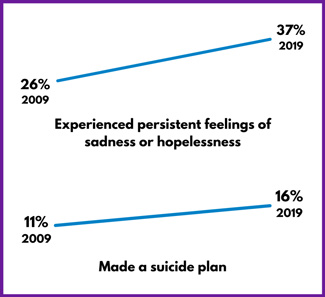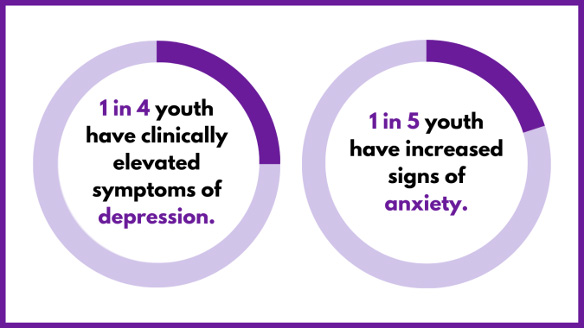
The State of Youth Mental Health
 Kate Endries, MSW, Senior Advisor of Trauma-Informed Practice, Boys & Girls Clubs of America
Kate Endries, MSW, Senior Advisor of Trauma-Informed Practice, Boys & Girls Clubs of AmericaAt Boys & Girls Clubs, just like in schools, afterschool programs and in homes across the nation, we’re hearing the same thing: kids are having behavior challenges, kids are feeling stressed, and kids are showing signs of struggling with their mental health.
Why Are Teens So Stressed?
In 2021, a U.S. Surgeon General advisory flagged youth mental health as a public health crisis.
When we consider the state of youth mental health, it’s important to look to the data. While mental health in kids and teens is a hot topic right now, mental health issues among young people have been steadily increasing for the past decade.
 10-year trend data from the CDC’s Youth Risk Behavior Survey
10-year trend data from the CDC’s Youth Risk Behavior SurveyIn a CDC study from 2019, 37% of high school students said they had experienced such persistent feelings of sadness or hopelessness in the past year that they couldn’t participate in their regular activities. About 1 in 6 students from the same study reported making a suicide plan in the past year.
So why do many teenagers feel depressed? While these concerns have been on the rise for over a decade, we’re now seeing a drastic increase in suicidal ideation, anxiety, feelings of loneliness, and depression due to the pandemic – all things that are associated with isolation and disruption to children’s safety, routines and socialization.
In fact, a 2021 study from JAMA Pediatrics reported that worldwide:

Rising youth mental health concerns can be seen across all age groups, not just teens. In a 2021 National Center on Afterschool and Summer Enrichment study, parents also reported increased social and emotional difficulties – such as hyperactivity and conflicts with peers – in their young children.
Why Is It Important to Talk About Mental Health?
Many young people worry about going to a parent or adult to share what’s on their mind, especially when it’s around mental health concerns.
In fact, Boys & Girls Clubs of America’s 2022 youth data shows that the majority of youth (71%) say when something important goes wrong in their life, they can’t stop worrying about it. And when something does go wrong, they try to keep people from finding out (67%).
That’s why it’s more important than ever that young people have safe, nonjudgmental adults they feel comfortable approaching about tough topics.
Normalizing conversations around mental health is key to ensuring young people (and adults) have the emotional, social and mental support they need. While the pandemic has been incredibly hard on all of us, it’s a rare silver lining that it’s also heightened our awareness on the topic of mental health as a society and started necessary conversations.
The phrase itself – “mental health” – can sound scary. But it’s important to know that mental health isn’t just illness. It’s your brain, it’s your body, it’s your feelings.
People often think about mental health very clinically. And while clinical diagnoses are important, and we need therapists and counselors more than ever in those cases, checking in with your child on their mental health should be something everyone does regularly. That way, when your child is facing a challenge, they know they can reach out to you (and you’ll know how to help).
And this can be simple things, such as asking your child open-ended questions like “When you’re frustrated, what do you do to make yourself feel better?” or “What is the best thing about school?”
Read on for more strategies for normalizing conversations about mental health with the young person in your life.
How to Support Your Child’s Mental Health
For many of us, we have a preventative role to play in mental health care for the kids and teens in our lives – and a lot of it happens naturally during parenting or working with youth. So, what does this look like?
- Build and maintain a strong and communicative relationship with your kids.
As a parent or caregiver, the most important thing you can do is build a trusting relationship with your child based on open communication. Ask questions and be an active listener. Here are some great conversation starters from our partners at On Our Sleeves to prompt some emotional check-in’s in a way that feels natural. - Know your kid’s patterns for what’s “normal” (and what’s not).
Stress, anxiety and depression show up differently from person to person, so it’s important to know your child and their baseline. As you begin to understand the different domains of your young person’s life – their relationships, their friends, their self-esteem, their hobbies, how they feel about school, their challenges and triumphs – you’ll be more attuned to what’s going well and what’s not. - Know the warning signs.
Know the warning signs of when kids are stressed, things like no longer seeing friends or acting out behaviorally. - Be their partner in addressing mental health concerns.
Whether it’s supporting your child in developing healthy coping mechanisms (such as breathing techniques, taking walks or journaling to alleviate stress) or connecting them with a caring mentor or mental health professional to delve deeper into how they’re feeling, be their partner in supporting healthy mental health.
Kids show up as their whole selves – their physical presence, their emotional needs and their mental health. When we talk about healthy mind habits the same way we encourage other healthy habits, such as exercise and eating right, we support our kids and teens in managing stress, building coping skills and knowing when to ask for help.
Stay in the Know
Learn more about youth mental health. Boys & Girls Clubs of America provides youth mentorship, mental health services and meaningful life experiences that boost youth self-esteem, build confidence and contribute to healthy mental, emotional and physical wellbeing. Sign up for our newsletter to receive the latest resources and stories.